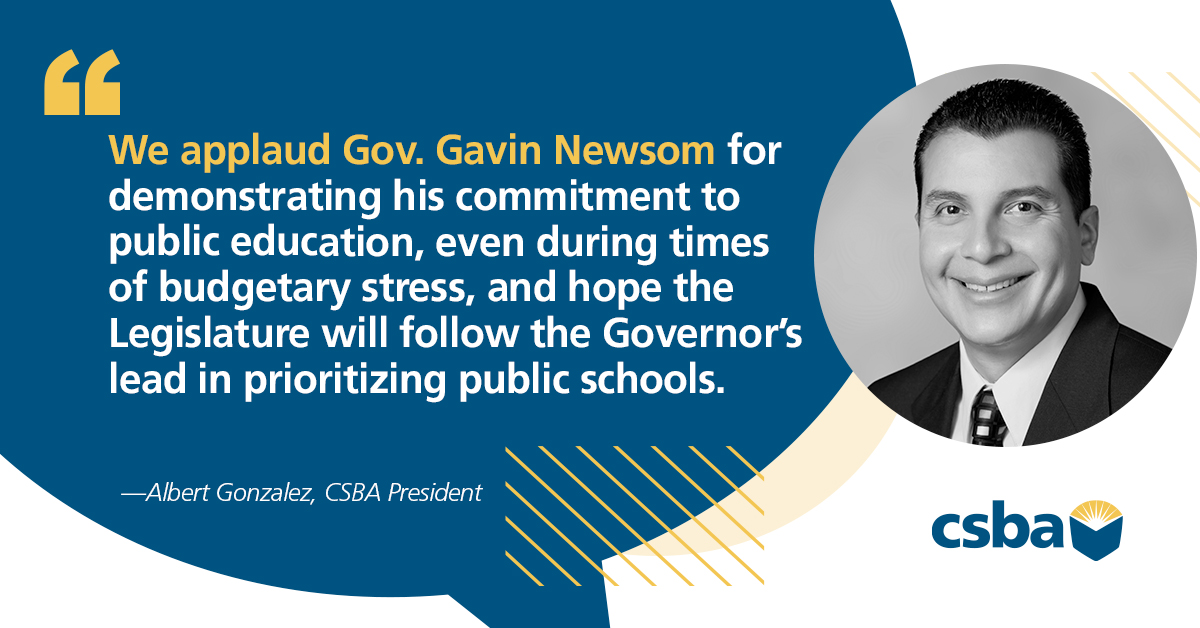Jan. 17:
Legislative Analyst’s Office responds to Governor’s January Budget Proposal
In December 2023, the nonpartisan Legislative Analyst’s Office (LAO) released its 2024–25 Fiscal Outlook, projecting the state’s budget deficit over the three-year fiscal period of 2022–23, 2023–24 and 2024–25 at $68 billion with a drop in the Proposition 98 Guarantee by $21 billion. On Jan. 10, 2024, Gov. Gavin Newsom announced the three-year budget deficit sitting at $37.86 billion — a nearly $30 billion difference. Referring to his January Budget Proposal as a “normalization” and a “correction” of the “distortions” seen in prior year budgets during the pandemic, the Governor proposes to fully fund the Proposition 98 Minimum Guarantee at $109.1 billion.
Three days after Gov. Newsom announced the state’s January Budget, the LAO provided its annual review of the Governor’s budget. The review is another development in what has become differing assessments of the size of the state’s budget deficit and what options lay before the Legislature in bridging the gap. In its explanation of the differences between the two projected budget deficits, the LAO stated it is “largely due to differences in what we consider to be baseline changes. The largest of these changes impacts schools and community colleges.” Describing the Governor’s approach as “plausible, but optimistic,” the LAO writes that the Governor relies on higher budget revenue projections to the tune of $15 billion, a reasonable dip into the state’s reserves and significant spending-related solutions, which may “pose challenges.” Concerningly, the LAO highlights that the Governor’s “budget lacks a plan for implementing proposed reductions to schools and community colleges, and some other solutions are unlikely to yield the anticipated savings.”
The LAO is making five recommendations to the Legislature as it begins its review of the Governor’s January Budget:
- Plan for lower revenues
- Maintain a similar reserve withdrawal
- Develop a plan for school and community college funding
- Maximize reductions in one‑time spending
- Apply a higher bar for any discretionary proposals and contain ongoing service level(s).
What’s next? With the release of the January Budget the Legislature’s budget hearing process will begin. It is anticipated that the differing budget projections will play a significant role as the Legislature will be faced with whether to use the Governor’s or the LAO’s projections, or somewhere in between.
CSBA’s Government Relations team will continue to provide updates and opportunities for advocacy as the budget cycle continues.
Jan. 11:
Gov. Newsom announces $37.86 billion budget shortfall, nearly $30 billion less than previously estimated by the state’s nonpartisan Legislative Analyst’s Office
Referring to his January Budget Proposal as a “normalization” and a “correction” of the “distortions” seen in prior year budgets during the pandemic, Gov. Gavin Newsom on Jan. 10 announced a substantially smaller-than-expected three-year budget shortfall of $37.86 billion. Acknowledging the volatile rise and fall in capital gains revenues, which were a significant contributor to the sharp increases in the 2021–22 and 2022–23 budgets, the Governor proposes to fully fund the Proposition 98 Minimum Guarantee at $109.1 billion.
“Based on our initial review of the Governor’s budget information, we’re encouraged that a $38 billion deficit — significantly smaller than the $68 billion shortfall predicted by the Legislative Analyst’s Office — has allowed the Governor to substantially maintain education funding at existing levels,” said CSBA CEO & Executive Director Vernon M. Billy. “We’re pleased by the decision to use the Proposition 98 Reserve, preserving base funding and flexibility for local educational agencies. If the Governor’s budget numbers hold, he has established a solid foundation on which the Legislature can build as the budget negotiation process continues.”
Read CSBA President Albert Gonzalez’s statement about the budget proposal »
CSBA hosted a webinar providing a deeper dive into the Governor’s proposal and its impact on school districts and county offices of education on Jan. 11. Governmental Relations staff broke down the budget with special attention paid to the local governance implications and reviewed how the Governor’s proposal addresses key CSBA budget priorities, including maintaining funding for the Local Control Funding Formula, student mental health services, staff recruitment and retention, transitional kindergarten implementation, cybersecurity and internet infrastructure, and pension relief. View a recording of the event below:
Proposition 98 Minimum Guarantee estimated at $109.1 billion
Proposition 98 will remain in Test 1 for the current year and the coming 2024–25 fiscal year. This includes a revised Prop 98 Guarantee for the current year at $105.6 billion, which is $2.7 billion below current funded levels.
The Governor’s proposal also includes a 0.76 percent cost-of-living-adjustment (COLA) for LCFF, an increase of $1.4 billion. To fully fund this increase and to maintain current year LCFF apportionments, the Governor proposes using the Proposition 98 Reserve Account.
Public School System Stabilization Account — Proposition 98 Reserve
To address the budget shortfall and slightly lower Prop 98 funding guarantee, the Governor proposes dipping into the Proposition 98 Reserve in the current 2023–24 fiscal year and in the coming 2024–25 budget year to the tune of $3 billion and $2.7 billion, respectively. There will continue to be deposits into the reserve as well in the amount of $752 million. This leaves a balance in the reserve of $5.7 billion in 2023–24, which continues to trigger the local school district reserve cap in the coming fiscal year.
Changes to attendance reporting
Included in the budget are proposed changes to “allow local educational agencies to provide attendance recovery opportunities to students to make up lost instructional time, thereby offsetting student absences, and mitigating learning loss and chronic absenteeism, as well as related fiscal impacts.” These changes include:
- Allowing LEAs to add attendance recovery time to the information reported to the California Department of Education (CDE) for both average daily attendance (ADA) and chronic absenteeism reporting.
- Requiring LEAs to provide remote instruction or opportunities to enroll in neighboring LEAs for emergencies lasting beyond five days and encouraging LEAs to provide hybrid or remote learning.
- Proposed allocation of $6 million in one-time Prop 98 General Fund to research and improve the delivery of hybrid and remote learning and disaggregated attendance reporting to reflect absences related to local and state emergencies.
Proposed changes to the Educational Revenue Augmentation Fund
Implemented by statute in 1992 to shift from the state’s General Fund to local property taxpayers some of the obligation to meet the constitutional minimum funding guarantee in Proposition 98 for K-14 education, the Educational Revenue Augmentation Fund (ERAF) has historically redirected property taxes statewide from cities, counties and special districts to school districts and community college districts. The budget proposes to also include charter schools within the existing ERAF distribution statutes.
Teacher preparation and professional development
The budget also proposes further accelerating how teaching candidates can meet the basic skills requirement and subject matter competency certification through the recognition of a bachelor’s degree as meeting the state’s basic skills requirement and improving the use of transcript review to determine subject matter competency.
Further, the budget proposes $20 million in one-time Prop 98 General Fund to establish a “train the trainers” program to support math coaches to provide training and support math teachers in the implementation of the Mathematics Framework adopted in 2023.
The proposal also directs the California Commission on Teacher Credentialing to create a new Elementary Arts and Music Education authorization for career technical education teachers.
School Facilities Bond and the School Facility Program
Although not a budget proposal, the Governor includes language in the budget summary stating that the “Administration expects to enter into negotiations with the Legislature on their education facilities bond proposals to reach agreement on a bond proposal to be considered in the November 2024 election.”
Additionally, and to help the budget shortfall, the budget proposes to reduce by $500 million (from $875 to $375 million) funding that was to be allocated in 2024–25 for the School Facilities Program and continues the delay in funding of $550 million for the Preschool, Transitional Kindergarten and Full-Day Kindergarten Facilities Grant Program into 2025–26.
Special education
As proposed, the Governor’s January Budget maintains funding levels for special education and provides the proposed 0.76 percent COLA for special education.
Last year’s budget required LEAs to begin screening students in kindergarten through second grade for reading difficulties, including dyslexia. The proposed budget provides $25 million in one-time Prop 98 funding through the K-12 mandated block grant to support literacy screening training for educators.
Universal school meals
The budget also includes a proposed increase of $122.2 million in ongoing Proposition 98 General Funds to fully fund the universal school meals program through 2024–25.
Broadband
Provides $5 million in one-time Proposition 98 General Funds to extend the Broadband Infrastructure Grant program that provides connectivity opportunities to low-income and poorly connected school sites.
Other significant K-12 budget adjustments
In addition to the above proposals, the administration announced the following budget adjustments:
- Decrease of $113 million in Proposition 98 General Funds in 2023–24 and $996 million in 2024–25 as a result of increased offsetting of property taxes.
- Increase of $65 million in ongoing Proposition 98 General Funds to provide a 0.76 percent COLA for the LCFF Equity Multiplier and specific categorical programs, which include Special Education, Child Nutrition, State Preschool, Youth in Foster Care, Mandates Block Grant, Adults in Correctional Facilities Program, Charter School Facility Grant Program, American Indian Education Centers and the American Indian Early Childhood Education Program.
- Decrease of $5 million to county offices of education in ongoing Proposition 98 General Funds to reflect drops in ADA and the 0.76 percent COLA.
- Continues $500 million in one-time Proposition 98 General Funds for the greening of school bus fleets.
- Provides $5 million in one-time Proposition 98 General Funds to extend the Broadband Infrastructure Grant program that provides connectivity opportunities to low-income and poorly connected school sites.
- Increase of $7 million in one-time Proposition 98 General Funds for a statewide repository of “curriculum-embedded performance tasks,” which will be used to assess student subject matter in science and critical thinking.
- Increase of $5 million in ongoing Proposition 98 General Funds to support the work of the California College Guidance Initiative.
- Additional $2 million in ongoing Proposition 98 General Funds to establish an Inclusive College Technical Assistance Center to assist LEAs in supporting students in the completion of the Free Application for Federal Student Aid (FAFSA) and related efforts in working with parents and higher education partners, and the identification of additional financial assistance resources.
- Increase of $1.5 million in ongoing Proposition 98 General Funds to support Homeless Technical Assistance Centers established via the federal American Rescue Plan Act.
- Increase of $3.4 million in state General Funds, including $380,000 ongoing for the State Special Schools Infrastructure Support Program to replace aging information technology hardware.
What’s next?
All eyes will now turn to the Legislature, where leadership in both houses have declared their support for protecting the investments made in education over the last several years. By May 15, Gov. Newsom will release his May Budget Revision, and negotiations between his Administration and the Legislature will be ongoing until the June 15 deadline for the Legislature to pass the budget bill. The Governor will then have until July 1 to sign it.
CSBA will continue to provide updates and opportunities for advocacy as the budget cycle continues.
Jan. 10:
CSBA President Albert Gonzalez’s full statement on the January Budget Proposal:





